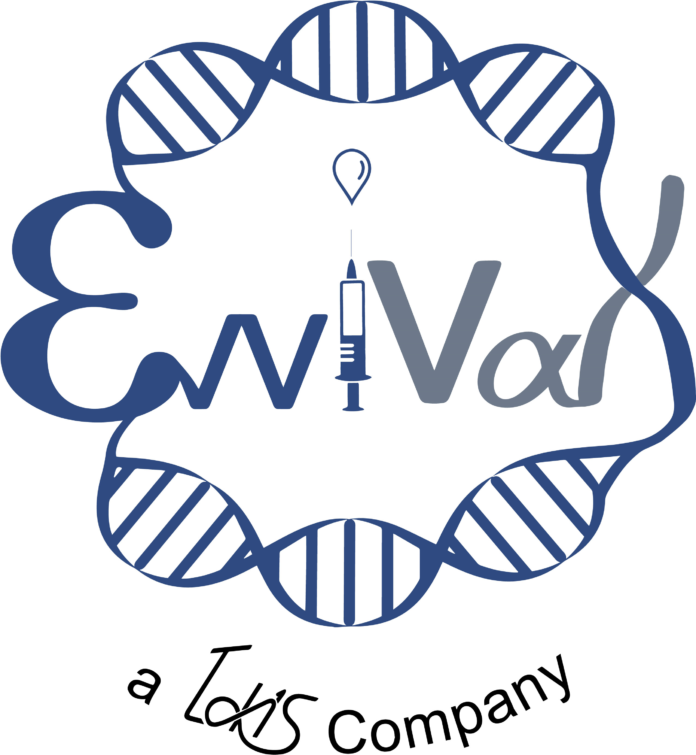STONY BROOK, N.Y. & ROME– Applied DNA Sciences, Inc. (NASDAQ: APDN) (the “Company”), a leader in Polymerase Chain Reaction (PCR)-based DNA manufacturing and nucleic acid-based technologies, and its program development partner, EvviVax, S.R.L. (“Evvivax”), today announced the publication of a manuscript detailing a preclinical study (the “study”) showing that LinearDNA™ vaccines used for cancer immunotherapy produced a strong immune and specific antitumoral response in preclinical mouse models. The study investigated the use of the LinearDNA platform to produce DNA vaccines targeting either tumor-associated antigens (TAA) or tumor-specific antigens (TSA or tumor neoantigens). The manuscript, “Linear DNA Amplicons as a Novel Cancer Vaccine Strategy,” is published online on the bioRxiv.org preprint server and has been submitted for peer-reviewed publication. LinearDNA is Applied DNA’s proprietary, large-scale polymerase chain reaction (“PCR”)-based manufacturing platform that allows for the large-scale production of specific DNA sequences.
DNA vaccines that target TAAs hold promise as potential pan-cancer vaccines that, when used in conjunction with existing standards of care, can increase the efficacy of cancer immunotherapies. DNA vaccines targeting TSAs, otherwise known as personalized cancer vaccines, also hold great promise in immunotherapy as they can be customized to induce an immune response only against a patient’s tumor, thereby limiting on-target, off-tumor effects.
TAA: TERT Vaccine
One aspect of the study used a DNA vaccine targeting telomerase reverse transcriptase (TERT), a TAA that holds potential as a target for a pan-cancer vaccine. The TERT DNA vaccine was designed by EvviVax and exclusively licensed by the Company for the LinearDNA platform for veterinary applications. In prior clinical trials conducted by EvviVax, a plasmid form of the TERT DNA vaccine administered along with the standard of care chemotherapy was shown to increase the survival of canines with Stage III/IV B cell lymphoma from 37 weeks to 97 weeks. B-cell lymphoma is the most common type of non-Hodgkin lymphoma in canines1, with lymphoma accounting for 15-20% of new cancer diagnoses in canines2. For the study, the TERT DNA vaccine was administered to mice in either plasmid DNA or LinearDNA form and the immune response studied and compared. The study’s results demonstrated that both the plasmid DNA and LinearDNA forms of the TERT DNA vaccine induced comparable immune responses in mouse models.
TSA/Neoantigens Vaccine
The second aspect of the study utilized a personalized DNA vaccine specifically targeting several TSAs expressed in a colon cancer mouse model. Personalized cancer vaccines hold great promise in immunotherapy as they can be customized to induce an immune response only against a specific patient’s tumor, thereby limiting off-tumor effects and increasing efficacy and therapeutic index. In the study, LinearDNA and plasmid DNA forms of the personalized cancer vaccine were administered to mice in the colon cancer model. For both forms of the DNA vaccine, several cohorts also received immune checkpoint inhibitors (ICI) based on anti-CTLA-4 and/or anti-PD1. The study demonstrated that the LinearDNA personalized vaccine produced an equal or greater immune and antitumoral response than the plasmid form of the same DNA vaccine, particularly when coupled with ICI.
Dr. James A. Hayward, president and CEO of Applied DNA, stated, “The study demonstrates that LinearDNA and plasmid DNA can elicit a comparable immune response in animal cancer models. We believe this study validates the use of LinearDNA as a more cost- and time-efficient alternative to plasmid DNA for DNA-based cancer vaccines. Cancer immunotherapy is relevant to veterinary and human markets; the latter is expected to reach $169 billion by 20283. As the exclusive licensee of the TERT DNA vaccine for veterinary applications, we believe these data support further investigation of the LinearDNA vaccine as a potential veterinary cancer immunotherapy and, beyond that, for human cancer immunotherapy.”
Dr. Luigi Aurisicchio, CEO and chief scientific officer of Evvivax S.R.L., commented, “We believe that DNA vaccines for cancer hold immense promise for both human and veterinary applications. One obstacle to DNA vaccine manufacturing is their current production as plasmid DNA. We believe that the completely cell-free LinearDNA platform avoids the numerous pitfalls of plasmid DNA-based production, making it ideal for DNA vaccine manufacturing broadly, and in cancer immunotherapy, specifically.”


